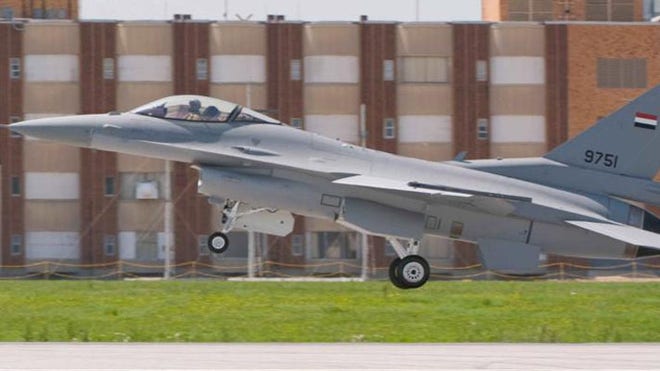Pressure builds to nix gift of tanks, F-16s to Egypt
Published January 02, 2013
FoxNews.com
Later this month, the new government in Egypt is scheduled to begin taking delivery of 10 F-16 fighter jets and 200 Abrams tanks – courtesy of U.S. taxpayers.
The $213 million deal is part of a foreign aid package signed when American ally Hosni Mubarak was president, but a growing chorus of critics say the Obama administration should pull the plug. They cite Egypt’s new Muslim Brotherhood government’s mixed signals to the U.S. and Israel, as well as America’s fiscal problems, as reasons for rescinding the deal.
“A Shariah dictatorship on Israel’s border – armed with American weapons – is a deadly threat to Israel and America,” reads a petition being circulated by The American Center for Law and Justice. “All U.S. funding to Egypt must be cut off until we can certify that aid to Egypt will help the national security interests of the United States and Israel.”
“This is a different government. The government we made that deal with is now in jail.”
- Jordan Sekulow, American Center for Law and Justice
The petition has garnered more than 150,000 signatures, and ACLJ Executive Director Jordan Sekulow believes it could bolster mounting opposition in Washington. Although the deal has already been approved by Congress and could only be rescinded by President Obama, Sekulow said lawmakers have leverage because Obama needs their backing for some $1.5 billion in aid earmarked for Egypt later this year.
“It’s all up to the president,” Sekulow said. “It will take people speaking out, and we have a limited time to act.”
Egypt would add the state-of-the-art F-16s, built by Lockheed-Martin, to its fleet of 200 fighter jets. The M1A1 Abrams battle tanks would allow Egypt to increase its number of tanks by 20 percent. The first delivery is to take place Jan. 22. Critics say the arms could end up being used against neighboring Israel or even against the Egyptian people, should Morsi ever face a Syria-style revolt.
Reneging on the deal would be justified, say critics, because new Egyptian President Mohamed Morsi’s Muslim Brotherhood has long supported terrorist groups in the Middle East. Since being elected, Morsi has declared himself above the law and rammed through a constitution based on Sharia law. Human rights advocates say the regime’s treatment of women and non-Muslims is cause for concern.
President Obama has even said that Egypt’s alliance with the U.S., which was solid during Mubarak’s 30-year reign, may be in a state of transition.
"I don't think that we would consider them an ally, but we don't consider them an enemy," the president told Telemundo in September.
Tearing up the agreement would not blemish America’s honor, given the new regime in Cairo, said Sekulow.
“Would we have given these to the Mubarak government when the revolution was occurring in Tahrir Square?” he said. “When things aren’t stable, you don’t just say, ‘Well we made this agreement two years ago so we have to go through with it.’
“This is a different government. The government we made that deal with is now in jail.”
A spokesperson at the U.S. Department of State declined to say whether the deal is being reviewed, but said the Obama administration seeks to “maintain a strategic partnership with Egypt that enhances the security and peace of the region.”
“We are closely following the political situation in Egypt,” the spokesperson said. “We support a stable and democratic Egypt, and we look to all Egyptians to resolve their differences peacefully.”
Florida Rep. Vern Buchanan, who recently called for ending foreign aid to Egypt altogether, told FoxNews.com last month the Muslim Brotherhood-backed Morsi government has been sending increasingly troubling signals to Washington, and giving it state-of-the-art fighter jets is a dangerous idea.
“American tax dollars must not be used to aid and abet any dictatorial regime that stands with terrorists,” Buchanan said.
Read more: http://www.foxnews.com/world/2013/01/02/pressure-builds-to-nix-gift-tanks-f-16s-to-egypt/?test=latestnews#ixzz2GrkkiXBp

No comments:
Post a Comment
Note: Only a member of this blog may post a comment.